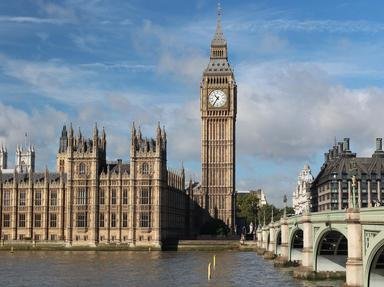Quiz Answer Key and Fun Facts
1. I'm an optimist, but an optimist who carries a raincoat (1960s)
2. Never complain; never explain (1870s)
3. A politician is a person with whose politics you don't agree; if you agree with him he's a statesman (1910s)
4. You turn if you want to...(October 1980)
5. Nothing matters very much, and few things matter at all (1900s)
6. There seem to me to be very few facts, at least ascertainable facts, in politics (1840s)
7. I believe it is peace for our time (September 1938)
8. Being in government is that you start at your most popular and least capable, and you end at your most capable and least popular (2000s)
9. The wind of change is blowing through this continent (February 1960)
10. The maxim of the British people is 'Business as Usual' (1914)
Source: Author
rossian
This quiz was reviewed by FunTrivia editor
stedman before going online.
Any errors found in FunTrivia content are routinely corrected through our feedback system.
